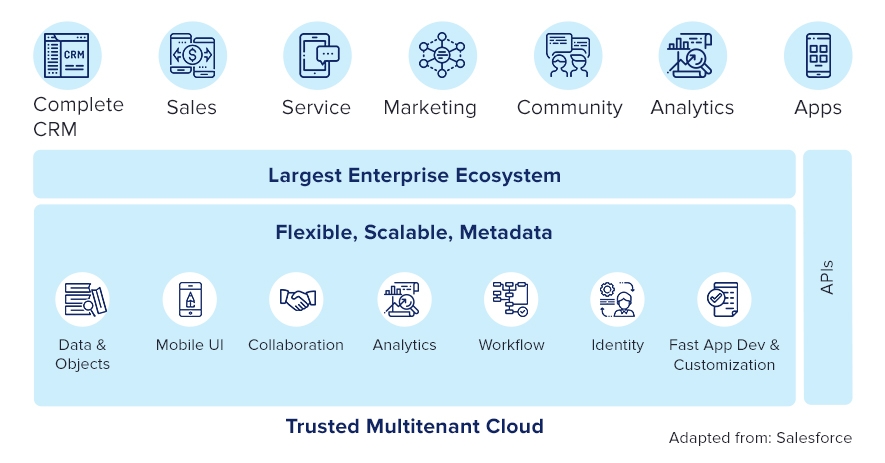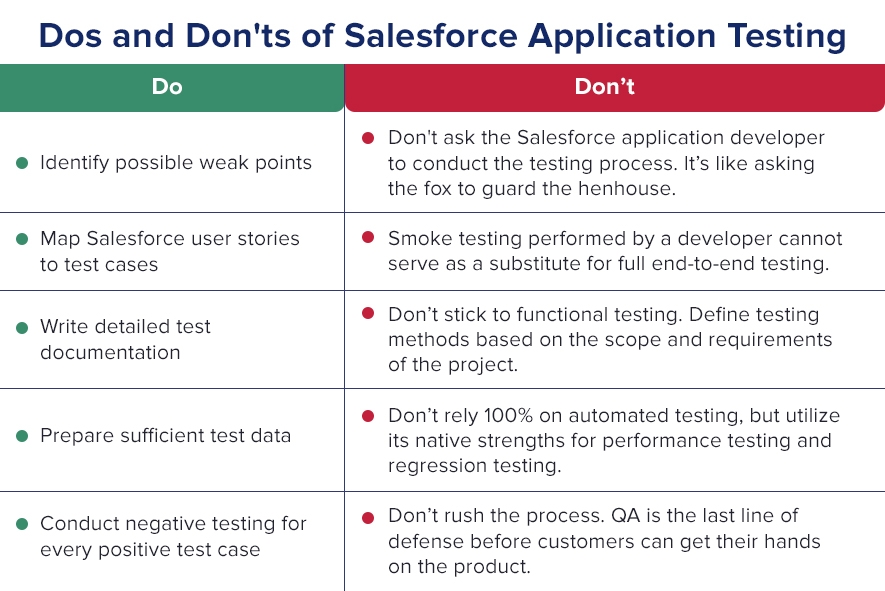- QATestLab Blog >
- QA for Business >
- How to Test a Salesforce Application
What makes Salesforce so popular is, of course, the functionality it provides, ease of use, and the possibility to personalize its flexible environment to perfectly fit the workflow. What’s more, it has universal nature – companies from any domain can make use of this CRM system.
Given how important customer relationship management is, testing is essential to identify functional, integration, and other underlying issues in such software and enhance its capabilities. Buggy features in an application can hurt revenue, while commercial success requires the product to be well-tested and debugged.
Salesforce Architecture Diagram
Salesforce system architecture all starts in the cloud, meaning everything is stored in the trusted, multitenant cloud system. It handles all of the infrastructure and maintenance, while companies can then develop their own applications, customized to meet their needs. It also integrates seamlessly with third-party apps – a feature that is difficult to come by with other CRMs.
The concept of a multitenant environment involves numerous instances based on one server. All customers within an instance share the resources and database, yet all client-specific data is separated.
Salesforce architecture is represented schematically in the following infographic:

What Can Salesforce Testing Reveal?
Salesforce application testing covers all the aspects of the product quality, so companies can improve and strengthen every weak point.
- Low user adoption is one of the most common problems, meaning that CRM software lacks sufficient features for offering a desirable UX. The list of issues may involve wrong customer classification, incorrect customer data, or bad UI.
- Various defects that lead to faulty customer management, such as undue notifications of customer appointments, miscommunication in emails and incorrect payment or delivery statuses, can severely impair the ability to address a customer’s pain points.
- Wrong calculations or poor integration of ERP modules, such as document management or data warehouse, lead to inaccurate and inadequately altered data. Lack of customer management visibility they may cause, results in a misleading picture of customers, blindfolding strategic decisions.
- CRM solutions need to comply with data security regulations, such as HIPAA, GDPR, etc. Otherwise, they would risk customer data or confidential business information being leaked.
Sample Test Scenarios
- User accessibility permissions in the system are running as expected.
- The contact information of the client can be captured.
- Contacts can be marked active/inactive.
- Any company can be marked as Customer or Prospect.
- Integrations with third-party services are working properly.
- Billing services work as expected.
- The mobile workflow works as expected.
- There is no data replication.
- Data sorting is done accurately.
- Graphs depict data accurately.
- Data is saved and updated correctly.
- All payment processes work as expected (placing orders, supporting orders in the back-office).
Dos and Don’ts of Salesforce Application Testing

Benefits of Test Automation in Salesforce
- Improved test coverage. Cloud-based applications require sufficient test coverage that includes executing hundreds of tests, validating edge cases, and much more.
- Increased speed and efficiency. Tests that would take hours to run manually can be performed faster if automated, which means more tests in less time and earlier time-to-market.
- Error-free test cases. While manual testing is error-prone, automated testing improves the accuracy of tests by removing the human factor.
- Automatic report generation. Real-time information on the progress and status of tests is available with in-depth reports.
QATestLab is a testing and test automation service provider helping enterprises validate their customized Salesforce functionalities and integrations with other enterprise apps. To learn more about the company, feel free to visit our website.
Learn more from QATestLab
Related Posts:
- No Related Posts
About Article Author
view more articles









Thank you for the useful article!